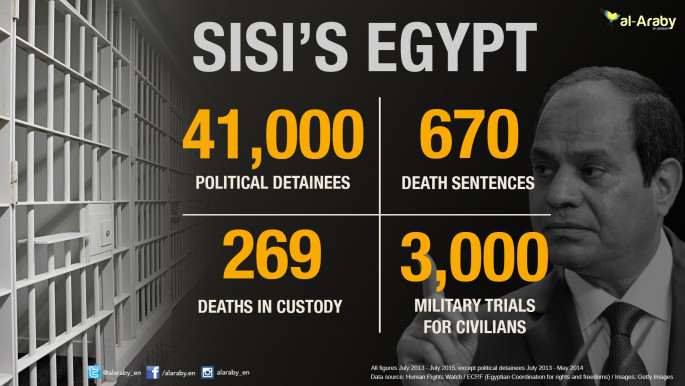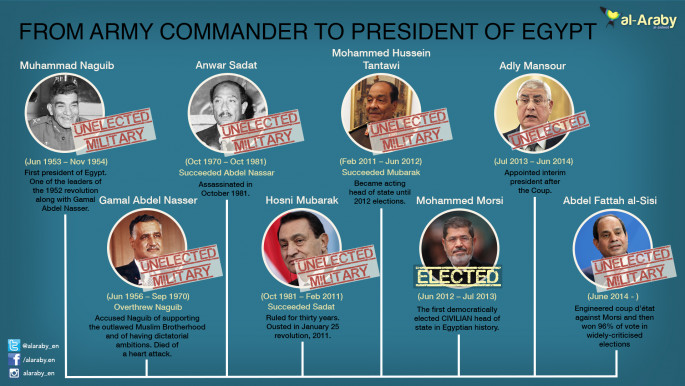Sisi's visit condemned as 'threat to UK national security'
Downing Street had issued a statement suggesting that President Sisi was vital in Britain's fight against the Islamic State group (IS, formerly ISIS) ahead of his visit to London.
The Labour leader, in a strongly worded statement, said Sisi's visit "shows contempt for human and democratic rights".
"Support for dialogue and negotiated conflict resolution in the Middle East is vital to us all. But to welcome and bolster with military support the coup leader who overthrew a democratically elected president in 2013 and has presided over the killing and jailing of many thousands since makes a mockery of government claims to be promoting peace and justice in the region," Corbyn's statement said.
"Support for dictatorial regimes in the Middle East has been a key factor fuelling the spread of terrorism. Rather than rolling out the red carpet to President Sisi, the prime minister should suspend arms exports to Egypt until democratic and civil rights are restored."
 |
Meanwhile, the Egyptian president Sisi defended his sweeping security laws ahead of his arrival in London on Wednesday for talks with British Prime Minister David Cameron.
"There is a real roadmap for democracy in Egypt," Sisi told BBC television ahead of his visit.
"The Egyptian people have been calling for change for four years. It is our utmost wish to meet their demands and work towards a better democratic future."
After longtime President Hosni Mubarak was ousted in 2011, Islamist President Mohammed Morsi was voted in, but he was deposed in 2013 by then-army chief Sisi after huge street protests.
Sisi was officially elected (with 96 percent of the vote) to succeed him in 2014 after brutally crushing all forms of opposition - Islamist supporters of the Muslim Brotherhood as well as secularists and leftists.
Around 1,000 supporters of Mohamed Morsi had been massacred as security forces broke up sit-in protests in central Cairo in August 2013.
"In the past five years, we have been living in a state of revolution. We want stability. We don't want to do this by force or suppression," Sisi said.
"But Egypt faces monumental problems. We are plagued by terrorism. No one is oppressed in Egypt. But we're living through incredible times."
Asked about human rights, he said: "What about the millions of Egyptians who face hardship every day? What about their human rights? What about the millions of young people who want a job and education?"
Campaign groups including the left-wing Stop The War Coalition were set to stage a rally outside Cameron's Downing Street office on Wednesday to protest against Sisi's visit.
Meanwhile, the London-based Amnesty International group urged Cameron to raise human rights concerns with Sisi.
"President Sisi's arrival in the UK is another key test of whether David Cameron is prepared to do more than roll out red carpets for authoritarian leaders," said its UK director, Kate Allen.
"There have been horrifying mass death sentences since President Sisi came to power - some after grossly unfair trials - and thousands have been detained in an attempt to quash all opposition."
 |
| click to enlarge |
Tightening security
Meanwhile, Downing Street said Cameron and Sisi spoke by telephone on Tuesday, during which they discussed the Russian plane crash in Egypt's Sinai peninsula.
"The prime minister said he looked forward to welcoming President Sisi to Downing Street on Thursday when they could talk further about the ongoing investigation and security cooperation between both countries," a spokeswoman said.
The Daily Telegraph reported that Sisi, ahead of his visit, called for NATO powers - including Britain - to help rebuild Libya, which has been beset by violence since an uprising backed by the Western military alliance toppled leader Muammar Gaddafi.
"It was a mission that was not completely accomplished," he was quoted as saying.
"We need to stop the flow of funds and weapons and foreign fighters to the extremists. All the members of - including Britain - who took part in the mission to overthrow Gaddafi need to give their help," Sisi said.
Egypt's president and Britain's prime minister have agreed on the need for "the tightest possible security" at the Sinai resort airport from which a doomed Russian airliner departed.
Investigators have yet to determine the cause of the crash in Sinai on Saturday which killed all 224 people on board the Kogalymavia Airbus A321 that had set off from Sharm el-Sheikh - a popular destination for British tourists.
The IS branch in the Sinai Peninsula claimed it downed the plane, but provided no details - and experts say other possibilities, including a mechanical failure that caused the plane to disintegrate in mid-air, are more likely explanations.
IS has also claimed responsibility for a bombing that killed six Egyptian policemen in Sinai on Wednesday.
Cameron and Sisi "agreed it was important not to pre-judge the investigation", the British statement said.
They "noted that there was still uncertainty about the cause of the crash and agreed it would be prudent to ensure the tightest possible security arrangements at Sharm el-Sheikh airport as a precautionary measure".
Egyptian state media said on Wednesday that Sisi had set off for his three-day visit to Britain.
Investigators began on Tuesday to examine the black box flight recorders retrieved from the crash site, as Sisi warned the investigation could take a long time.



